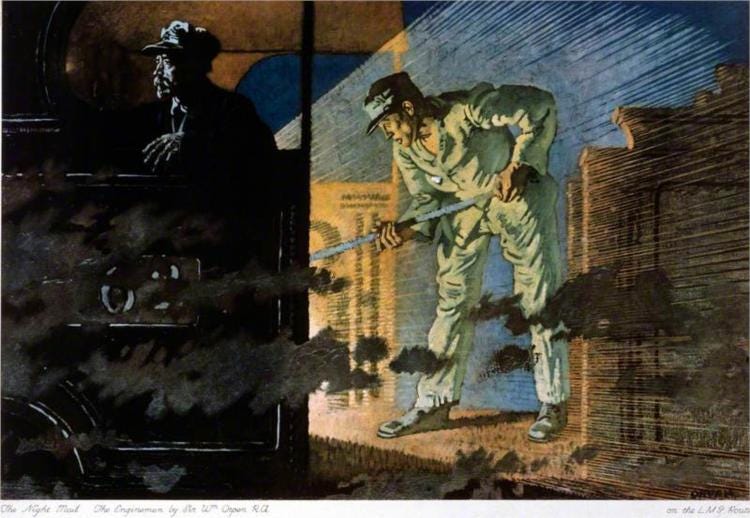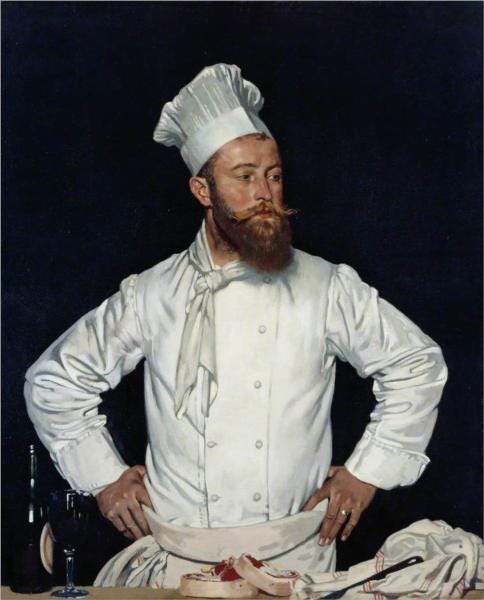#45 - On Determining the Qualities of Manhood
“What is a skill or quality that every man should have?”
Hello, my friends,
Welcome to the interlude between Christmas and the new year, the time when all small talk is the same. How was your Christmas? Any exciting plans for New Years? One of my colleagues mentioned that it was hard to work during this time of year because it’s generally quiet and lots of folks are out of the office. Not I, I work from home around 3/4 of the time so fully 100% of the workforce at this location is on the job. Some people have trouble focusing when they telework. I’ve never had that problem. The opposite actually, since I’d be chattering with my co-workers a lot more if I was in my cube. Also, I’ve been writing — a solitary activity requiring focus that I mostly do at home — much longer than teleworking for the library which has accustomed me to sitting down and getting to it. You receiving HMF every Friday morning for 45 weeks in a row is tangible proof of that.
Anyway, how was your Christmas? As a late gift (or pile of coal?), here’s an essay on masculinity:
Over the past week or so, I’ve asked a few people in my life the question: “What is a skill or quality that every man should have?” The answers have varied and I will share them in a moment, but before that, is it just me or does this question feel somehow old-fashioned? Implicit in it is the assumption that there are skills and qualities that are more distinctive to a particular gender. In my (and maybe your) world, where the metaphor for gender is a limitless hug rather than a network of border walls, that kind of delineation comes across as passé. And yet. And yet I swim in many waters, and in some of them are young (and sometimes not-so-young) men who are unsure how to exist as (cis-gendered) men. As I get older and remain more-or-less squared away in the traditional sense (home, education, career, marriage, kids), I wonder about masculinity. Specifically, what should older guys, potential role models, be showing the next generation of men? What are the important lessons for how to exist and relate to the world around them?
My own initial answer to the question (“What is a skill or quality that every man should have?”) was not a specific skill or quality but an overall competence; A man should be generally competent as a fundamental starting point. I don’t mean be a master of everything, but the capacity to put in a good effort at learning the skills their lives require and becoming proficient enough. The women I spoke to had a tangentially-related answer, they felt that men should be able to “adult” properly. Essentially, that men need to be able to have the basic skills to survive as an adult: Cooking, laundry, personal finance, etc. They felt that too many men make it to the age of majority without having been fully prepared to leave their childhood behind.
Speaking of leaving childhood behind, another person I talked to (a man) brought up the mythopoetic point-of-view, hearkening back to the hero’s journey of Joseph Campbell, where a young boy or teenager needs to prove himself through a (dangerous) trial or ritual in order to be initiated into the world of manhood. The preparation for the journey and the trial itself are meant to forge the traits that comprise masculinity. Presumably, such characteristics would include courage, confidence, resourcefulness, poise, and the like. Every “real” man, then, will have, at some point in his development, “looked into the eyes of the beast” and come out on the other side.
It’s curious to me to even write “real man” without an asterisk since swimming in many waters as I do means I come into contact with differing notions of masculinity and gender in general. Class, geography, ethnicity, religion, political leaning, career, all play a part in determining what’s considered “manly” and how open-ended gender can be. Over time, my view relies more on a probabilistic view of gender norms, rather than any definitive answer. I take the probabilistic view because it acknowledges that 1) No traits are exclusive to any gender, 2) Gender definitions differ (sometimes widely) by group and within groups, and 3) It does not signify an objective truth, simply what a majority of a group believes. This is important to me because there always needs to be a value-neutral place for self-identification regardless of group. It’s also important because I don’t believe humans really know that much about psychology as the whole and, by extension, such a complicated thing as gender.
The probabilistic view goes: I believe that if any group was asked — and decided that the survey instrument was not nonsense (which is a legitimate response) — to identify characteristics for each gender, and then those were plotted on a curve based on frequency of specific responses, there would likely be significant commonality among respondents. Of course, among groups, there would be major differences (ie compare the responses of the student body of a liberal arts college to those of a megachurch in Kentucky) but, for instance, the entire population of the United States (or a representative sample…which is 385 with a 95% confidence level) would probably generate some clear information about what traits a lot of the group considers linked to a specific gender.
If such a survey were done, and it may have been, my prediction is that the traits associated with masculinity would be a smattering of what I have above and others: Confidence, courage, assertiveness, strength, adventurousness. There are probably some I’m forgetting. So it follows that a reasonable answer to “What is a skill or quality that every man should have?” when it comes to developing said qualities or skills in a majority men within a group who are seeking direction would be to direct them to guided activities that build those traits such as competitive physical activities like individual or team sports, challenging outdoor activities like hike-in camping, or demanding intellectual pursuits. It seems to me that being opposed by an opponent, inanimate object like a mountain or cold weather, or a difficult concept is vital to development of traditionally masculine traits.
The problem, of course, is that while those activities may work to develop qualities that the American population considers manly, it wouldn’t necessarily speak to the “adulting” response of my interlocutors above. But have no fear, I have an idea. Something that could both amplify courage and confidence and assist in building mature, responsible men. It’s something that has been around for a long time, though not quite like this, something that could also be both highly entertaining and instructive for observers. What is this insanely genius idea? High school and college cooking competitions for men!
But I’m not talking simply iron chef style where the ingredients are conveniently ready for use, I’m talking farm-to-table. Competitors will have to learn about and create every aspect of the dish they intend to serve. Want to cook drumsticks? Go take care of the chickens, kill the bird, butcher it, and then you can have your fried chicken. Can’t handle killing a live animal that isn’t a bug? I guess you might be cooking a vegan dish. Still, you’ll have to help grow the crops you’re using before you can chop them into your oil-slicked pan. It’ll be a lot of work, but dang it, every boy who participants in this year-long competition will wind up a man. A man who has demonstrated hard work and responsibility, understands the consequences of their actions, and, oh yeah, can cook!
Mission accomplished.








Okay, well, I know better than to engage on issues of masculinity, femininity and gender online, even though it's been a lifelong area of study. But I will say that I definitely have a competence fetish. I don't care how attractive a man is, if he's not good at what he does, I have no interest (and being good at being pretty does not count). And as you know, I have a particular thing for creative geniuses....
First of all, I expressly forbid you from making admission to the 'man club' dependent on anything involving cooking. It is pretty much my area of greatest life incompetency!
I have sometimes found the search for a specifically male identity puzzling. Why the need to define oneself apart from women? Why not have an identity as a human being? But then I am not typically male, more a Strange Creature of the Forest. From that perspective, aspiring to be human is challenging enough!
The 'Cinematherapy' series of videos is really great, where they discuss movies as they relate to personal psychology.
https://www.youtube.com/watch?v=pv_KAnY5XNQ
In this one, they praise Aragorn in 'The Lord of the Rings' as combining traditionally masculine virtues - courage, strength, resourcefulness - with sensitivity and tenderness, instead of with the 'toxic masculine' qualities of domination, sexism etc.